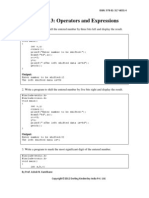0% found this document useful (0 votes)
259 views9 pagesClass7 (Constructor in Java)
Constructors in Java are special methods that initialize objects. There are two types of constructors: default constructors that take no parameters, and parameterized constructors that receive parameters. Constructor overloading allows creating constructors with the same name but different parameters. A copy constructor initializes a new object using an existing object of the same class. Constructors differ from methods in that they are called implicitly during object creation, have no return type, and are not inherited by subclasses.
Uploaded by
Doton DuttaCopyright
© © All Rights Reserved
We take content rights seriously. If you suspect this is your content, claim it here.
Available Formats
Download as PDF, TXT or read online on Scribd
0% found this document useful (0 votes)
259 views9 pagesClass7 (Constructor in Java)
Constructors in Java are special methods that initialize objects. There are two types of constructors: default constructors that take no parameters, and parameterized constructors that receive parameters. Constructor overloading allows creating constructors with the same name but different parameters. A copy constructor initializes a new object using an existing object of the same class. Constructors differ from methods in that they are called implicitly during object creation, have no return type, and are not inherited by subclasses.
Uploaded by
Doton DuttaCopyright
© © All Rights Reserved
We take content rights seriously. If you suspect this is your content, claim it here.
Available Formats
Download as PDF, TXT or read online on Scribd
/ 9

























































































